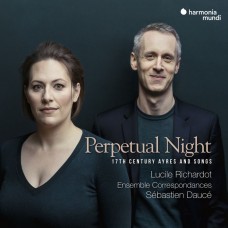您的購物車沒有添加專輯!
搜尋
永恆的夜晚(17世紀歌謠) 露西.黎夏朵 女中音 和諧古樂團 / Perpetual Night / Richardot & Dauce & Ensemble Correspondances
專輯編號: HMM902269
專輯類型: 單CD
發行年份: 2018
國際條碼: 3149020226926
音樂家:
庫存狀態: 有庫存
|
The circulation of artists and sovereigns between France and England in the seventeenth century resulted in the establishment of highly original genres in the latter country: the first recitatives, large-scale airs from masques and dramatic 'scenes' provided fertile ground for experimentation and prepared the way for the birth of semi-opera. SEbastien DaucE explores this English vocal art in a programme tailor-made for one of today's most fascinating voices: Lucile Richardot, in the exquisite setting provided by Correspondances, subtly blends music, love, night and melancholy.
|
編號 |
曲目 |
長度 |
作詞 |
作曲 |
演奏 |
樂團 |
演唱 |
指揮 |
試聽 |
|---|



